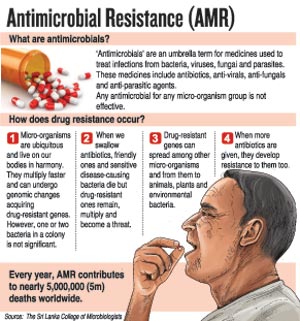News
Super bugs on a winning streak due to misuse of antibiotics, warns top microbiologist
View(s):
Dr. Malika Karunaratne
Super bugs are causing serious worry to Sri Lanka’s health sector and the President of the Sri Lanka College of Microbiologists, Dr. Malika Karunaratne takes a close look at them as well as how to curb them from becoming a major threat to humanity.
“Usually when we treat microbial infections with antimicrobials, these micro-organisms or bugs die. However, these bugs are very smart, unlike at the beginning of the miracle antibiotic era and are becoming ‘super bugs’ which are resistant to most antibiotics,” warns Dr. Karunaratne.
Having just completed the World Antimicrobial Resistance Awareness Week (WAAW) this week from November 18-24, she strongly cautions against the “misuse” and “overuse” of antimicrobials, which lead to anti-microbial resistance (AMR), being dubbed as a “silent” pandemic.
“All infections do not need to be treated with antimicrobials. Our immune system would do the job for a common cold, diarrhoea or laryngitis with hoarse voice,” she says, stressing that taking antibiotics unnecessarily is a misuse of antimicrobials. Antimicrobials should be taken only after being prescribed by a doctor.
Dr. Karunaratne says that if antibiotics are needed, while the doctor would write the dosage, timing and duration clearly, it is important for a patient not to share antibiotics, or any medicine for that matter, with others. Leftover antibiotics should also not be given to pets.
“People can prevent getting an infection by drinking safe water and eating safe food, while also getting the specified vaccinations on time,” she says, pointing out that as the antibiotic pipeline is drying up due to various reasons, the bugs seem to be on a winning streak. No new antibiotics are being developed as it is not lucrative to the pharmaceutical industry and it needs to invest much time, effort, manpower and research to this task.
AMR is a major threat not only to human health but also terrestrial and aquatic animal health, plant health, food production, food safety, environmental safety and global developmental goals, it is understood.
Dr. Karunaratne urges that we should not “step back” into the pre-antibiotic era when maternal deaths, infant deaths, deaths from sepsis, and tuberculosis and deaths among battle-front soldiers with infected wounds were very high. It was only after the discovery of penicillin by Sir Alexander Fleming in 1928 that it changed. If there is misuse and overuse of antibiotics bringing on AMR, there would be another dark era.
The World Health Organization (WHO) has predicted that infections due to multi-drug resistant bacteria would be able to generate a pandemic, if no action is taken. The estimated annual death rate due to AMR by 2050 would be 10 million, 10 times more than the current rate. It would be more than the rate of cancer deaths at present.
 The Sri Lanka College of Microbiologists had implemented numerous activities during WAAW including prescriber awareness programmes for medical students, medical officers and clinicians; awareness on AMR for pharmacists; and also public awareness campaigns.
The Sri Lanka College of Microbiologists had implemented numerous activities during WAAW including prescriber awareness programmes for medical students, medical officers and clinicians; awareness on AMR for pharmacists; and also public awareness campaigns.
Meanwhile, at national level Sri Lanka had developed and implemented the first National Strategic Plan for Combating AMR in 2017 (NSP 2017-2022) based on the Global Action Plan on AMR (GAP-AMR). The strengths and weaknesses in implementing the first NSP had also been identified.
The Sri Lanka College of Microbiologists with the relevant stakeholders and WHO support has developed the second NSP for Combating AMR in Sri Lanka & National Action Plan with Monitoring and Evaluation 2023-2028. Among other measures, the NSP plans to improve coordination for OneHealth AMR.
The college has also formulated the second edition of ‘National Guidelines on Empirical and Prophylactic Use of Antimicrobials’. It is available as hard copies, soft copies and a software application.
The best way to say that you found the home of your dreams is by finding it on Hitad.lk. We have listings for apartments for sale or rent in Sri Lanka, no matter what locale you're looking for! Whether you live in Colombo, Galle, Kandy, Matara, Jaffna and more - we've got them all!

